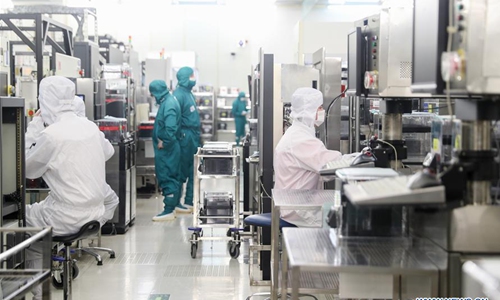Short-sighted US export rules will backfire: experts
By GT staff reporters Source:Global Times Published: 2020/4/28 20:58:40

Staff members work at a workshop of a semiconductor company in Shanghai, east China, Feb. 10, 2020. (Xinhua/Ding Ting)
The tightening of US export rules, which might influence the sales of semiconductors to China, will not threaten or hamper Chinese defense companies that have long been prepared for it, analysts said on Tuesday.
The moves only reflect the irrationality and nearsightedness of US politicians, and the situation will further pressure the US' struggling economy.
The US said on Monday it will impose new restrictions on exports to China to keep semiconductor production equipment and other technologies away from China's military, according to a Reuters report.
"The new rules will require licenses for US companies to sell certain items to companies in China that support the military, even if the products are for civilian use. They also do away with a civilian exception that allows certain US technology to be exported without a license," said the report.
The move was not "unexpected" for Chinese defense contractors, as they've been making preparations amid the country's efforts to become fully independent, Ma Jihua, a veteran industry analyst, told the Global Times on Tuesday.
The results in China are likely to include a further push for cross-industry cooperation, closer alignments among Chinese manufacturers, and moves by more Chinese companies to prepare a plan B of their own, said Ma.
Guide Infrared, one of the leading suppliers of infrared thermal imaging products in China, told the Global Times on Tuesday that the US's proposed ban will have no influence on the company's operations.
"Even if there will be some impact in the future, it will not be on core components but only on some accessories that will not have a direct impact on the company," it said, adding that as China is on its path to rapid work resumption, it can always find alternatives.
"The impact on our industry will be limited, and we have not imported any components from the US for a long time," an insider in a private company that makes night-vision military products to the People's Liberation Army, told the Global Times, adding that Russia, Germany and Switzerland are now the firm's main import sources.
"But some companies that import large quantities of US components might be more affected," the insider said.
"China is fully capable of independently manufacturing military-use integrated circuits, but due to our low commercialization rate, the costs are high - that's why some still prefer to use imported chips," Ma said.
According to an industry report obtained by the Global Times, military semiconductors account for 2 percent of China's total weapons expenditure, and the annual market potential is expected to reach 6 billion yuan ($853.4 million).
"The tightening of exports, which comes as US is relying on China for crucial medical supplies amid the pandemic, shows that the US politicians are determined to confront China in an irrational way," Sang Baichuan, director of the Institute of International Business at the University of International Business and Economics, told the Global Times on Tuesday.
Although China has countermeasures that it can take, such as including US firms on China's own Entity List, doing so will only worsen the friction between the world's two largest economies. That won't be good for the world economy, which is under the pandemic's shadow, and China does not want to see that happen, Sang said.
"China will likely take a rational and restrained approach while dealing with its relationship with the US," Sang said.
Posted in: ECONOMY,BIZ FOCUS